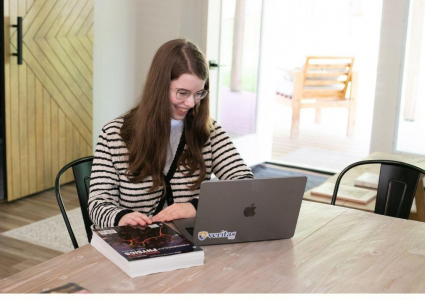5 Ways to Succeed at Online Learning

In 2013 I took the job Veritas offered me to prove that the pedagogy required in classical education was NOT possible to deliver in the online classroom. Yes, you read that correctly. I was convinced that it wouldn’t work. I had an inkling that the future of education around the world was going virtual, but as a lover of classical education, and as a classical educator, I thought the incarnational aspect of the classical method was far too important for the pursuit of the good, the true, and the beautiful to transmit in a virtual way. I was convinced, but I also needed to prove my hypothesis, so I accepted the job.
As you might have guessed, now that I’m the Dean of Students at the oldest online classical Christian school in the United States, my hypothesis failed utterly, and instead I became convinced that online learning when done well, was an incredible format to partner with parents to encourage students to pursue what is good, true, and beautiful, and to be trained in thinking logically, speaking and writing winsomely, and most importantly of all to grow in wisdom.
What I have learned along the way is that not all students succeed at online learning, but all the students that do succeed all share the same five traits.
1) They are Prepared
Research schools, research their learning management systems, but more importantly research their administration and faculty. Do you align with the mission of the school? Will this be a good fit for your child? Learn these terms: asynchronous and synchronous learning (or what we at Veritas call Self-Paced Courses or Live Online Classes).
A student who will do well in a self-paced class will most likely be an independent, self-starter, who is able to learn from a mainly lecture format, and who does not need the interaction with a teacher or their classmates to keep them motivated to learn and make progress. Grades are computer generated. This is a great option for the student who needs a flexible schedule, but may not work well with all types of learners.
Live online classes are teacher directed, set at specific times, and require much interaction with the teacher and students. A student’s participation in class is vital. The teacher does all the grading and instruction. These work very well for all kinds of students with different learning needs, and because the student has the teacher support, most students thrive. Another incredible advantage to online learning is that the student will interact with students who live all over the world. Exposure to such different perspectives is invaluable for their mental development.
2) They are Organized
A good online school will be incredibly well-organized. Parents and students should take advantage of this organization by asking lots of questions and doing their research. What is the best technology for success? Is our internet connection strong enough? What books and supplies are needed for each course? Even if the student is learning from home they need to have a designated learning space. An organized student will not be in bed still wearing pj’s attempting to retain new information. Parents can help by ensuring that the environment a student is learning in is right for their needs and is organized in a way that will help their child thrive. Should you try a standing desk? Does your student need to sit on an exercise ball to help them stay attentive? Does your child learn better in an environment that is sparsely decorated, or do they need color and lots of pictures on the walls? One of the most wonderful things about learning online and from home is that each learning space can be tailored and organized to the individual needs of the child.
3) They learn how to manage their time.
Planning ahead and creating schedules for each student is vital. At Veritas each course provides a course assignment sheet that tells the student all daily assignments, quizzes, projects, and tests and their corresponding due dates for the entire school year. These should be printed off and be used to construct a weekly and daily schedule. Include all activities and responsibilities on those schedules including chore time, gym time, extracurriculars, class time, homework time, and social events. Help students learn to ask the questions: What needs to be accomplished daily? What big assignments should I get a head start on? In order to take a vacation and time off what do I need to work ahead on? With good training in the younger years older students will be able to construct this schedule on their own. Our alumni frequently tell us that their time at VSA made them tremendously successful in college not just academically, but through the time management skills they had to learn while balancing a rigorous course load.
4) They choose to engage
Our teachers joke that when taking attendance in a live online class they note the students who are present, and then they note the zombie students. Zombie students have logged into class, but are clearly not listening, and make no effort to engage either in discussion, chat box, or through webcam. In an online class students who thrive are the ones who choose to engage.
Choosing to engage is actually necessary for every student regardless of whether it’s in a brick and mortar classroom or an online class. Students must daily choose to engage. Resist the enticement of apathy. Students who choose to engage soon realize how fun, how enriching, challenging, and exciting class time can actually be. Engage with the teacher, engage with your classmates. Ask questions. Take notes. Laugh, and enjoy yourself. VSA has the privilege of hiring some of the greatest educators around the world. Students who engage both during class and on discussion boards, and in office hours thrive and flourish.
Parents can help in the early stages of the school year by encouraging their students to focus, eliminate distractions of cell phones, video games, toys or too much extraneous noise and encourage them to focus and engage. It takes courage to engage and to take risks in the classroom. These risks are always worth it.
5) They invest in relationships
What naturally follows an engaged student is a desire for deeper relationships with their teachers, and a desire to know their classmates better. Humans will always desire the “incarnational” time. This is a good desire. This desire often translates into traveling to get together with classmates and teachers if and when possible. Besides offering online clubs, online social gatherings, and online discussion boards which facilitate friendships, VSA offers international field and mission trips along with an end of the year gathering in Lancaster, Pennsylvania which all offers a time to build upon the friendships and relationships developed in the online classroom. Yes, it really is possible to make friends and have incredible relationships with your teachers in an online environment. We’ve even had students meet at this school who have later married each other. Teachers regularly report that alumni stay in contact and call them to ask them for prayer and advice.
So… Prepare! Organize! Manage Time! Engage! Invest!...and succeed at online learning.
And speaking of success...we here at Veritas wish you all to have great success as you guide your students through the 2020-2021 school year!






